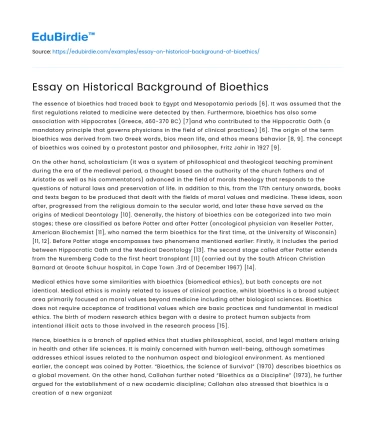The essence of bioethics had traced back to Egypt and Mesopotamia periods [6]. It was assumed that the first regulations related to medicine were detected by then. Furthermore, bioethics has also some association with Hippocrates (Greece, 460-370 BC) [7]and who contributed to the Hippocratic Oath (a mandatory principle that governs physicians in the field of clinical practices) [6]. The origin of the term bioethics was derived from two Greek words, bios mean life, and ethos means behavior [8, 9]. The concept of bioethics was coined by a protestant pastor and philosopher, Fritz Jahir in 1927 [9].
On the other hand, scholasticism (it was a system of philosophical and theological teaching prominent during the era of the medieval period, a thought based on the authority of the church fathers and of Aristotle as well as his commentators) advanced in the field of morals theology that responds to the questions of natural laws and preservation of life. In addition to this, from the 17th century onwards, books and texts began to be produced that dealt with the fields of moral values and medicine. These ideas, soon after, progressed from the religious domain to the secular world, and later these have served as the origins of Medical Deontology [10]. Generally, the history of bioethics can be categorized into two main stages; these are classified as before Potter and after Potter (oncological physician van Reseller Potter, American Biochemist [11], who named the term bioethics for the first time, at the University of Wisconsin) [11, 12]. Before Potter stage encompasses two phenomena mentioned earlier: Firstly, it includes the period between Hippocratic Oath and the Medical Deontology [13]. The second stage called after Potter extends from the Nuremberg Code to the first heart transplant [11] (carried out by the South African Christian Barnard at Groote Schuur hospital, in Cape Town .3rd of December 1967) [14].
Save your time!
We can take care of your essay
- Proper editing and formatting
- Free revision, title page, and bibliography
- Flexible prices and money-back guarantee
Medical ethics have some similarities with bioethics (biomedical ethics), but both concepts are not identical. Medical ethics is mainly related to issues of clinical practice, whilst bioethics is a broad subject area primarily focused on moral values beyond medicine including other biological sciences. Bioethics does not require acceptance of traditional values which are basic practices and fundamental in medical ethics. The birth of modern research ethics began with a desire to protect human subjects from intentional illicit acts to those involved in the research process [15].
Hence, bioethics is a branch of applied ethics that studies philosophical, social, and legal matters arising in health and other life sciences. It is mainly concerned with human well-being, although sometimes addresses ethical issues related to the nonhuman aspect and biological environment. As mentioned earlier, the concept was coined by Potter. “Bioethics, the Science of Survival” (1970) describes bioethics as a global movement. On the other hand, Callahan further noted “Bioethics as a Discipline” (1973), he further argued for the establishment of a new academic discipline; Callahan also stressed that bioethics is a creation of a new organization in which researchers could examine and analyze their medical dilemmas [16]. German theologian Fritz Jahr published numerous articles in the years 1927, 1928, and 1934 using the German term called “Bio-Ethik” which translated as “Bio-Ethics” and further argued to emphasize more on a more civilized, ethical approach to events related to human beings and biological environment [17]. His bio-ethical perspective further elaborated as; “Respect every living thing, in principle, as an end not as a means in itself and treat it accordingly wherever it is possible”[18].
Bioethics addresses the following types of assumptions such as; it decides what researchers should perform (what decisions or choices are morally right or acceptable to perform), it explains why researchers should do something, and how they justify their choices or decisions using morally appropriate terms. Bioethics also describes how researchers could do something with a method or in a manner of their response.






 Stuck on your essay?
Stuck on your essay?

